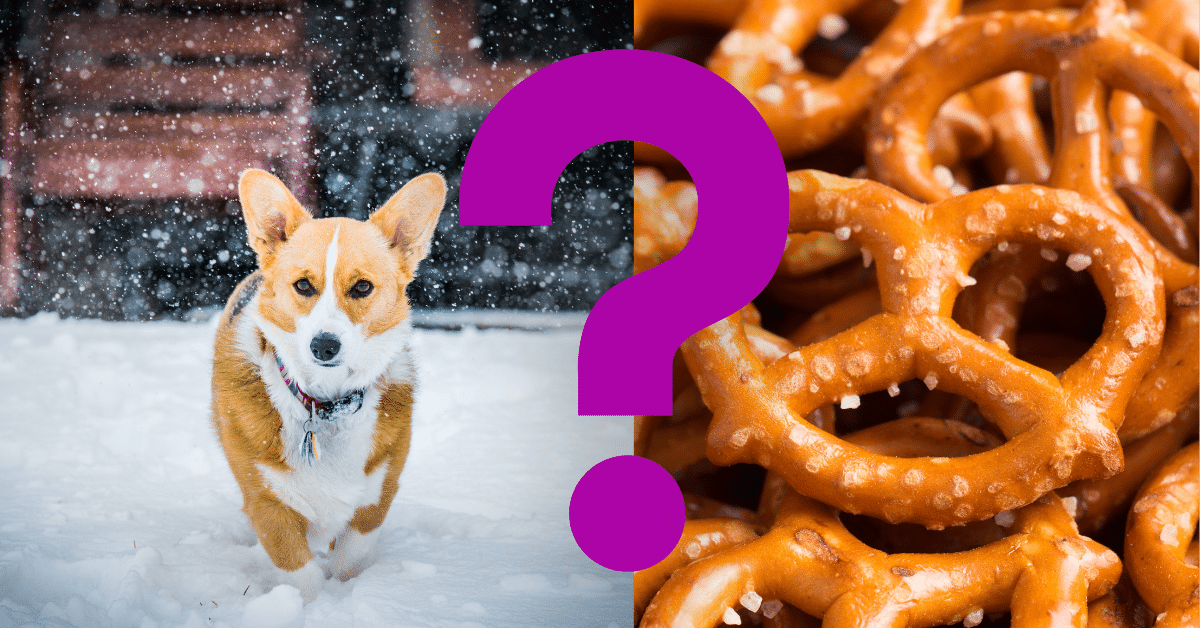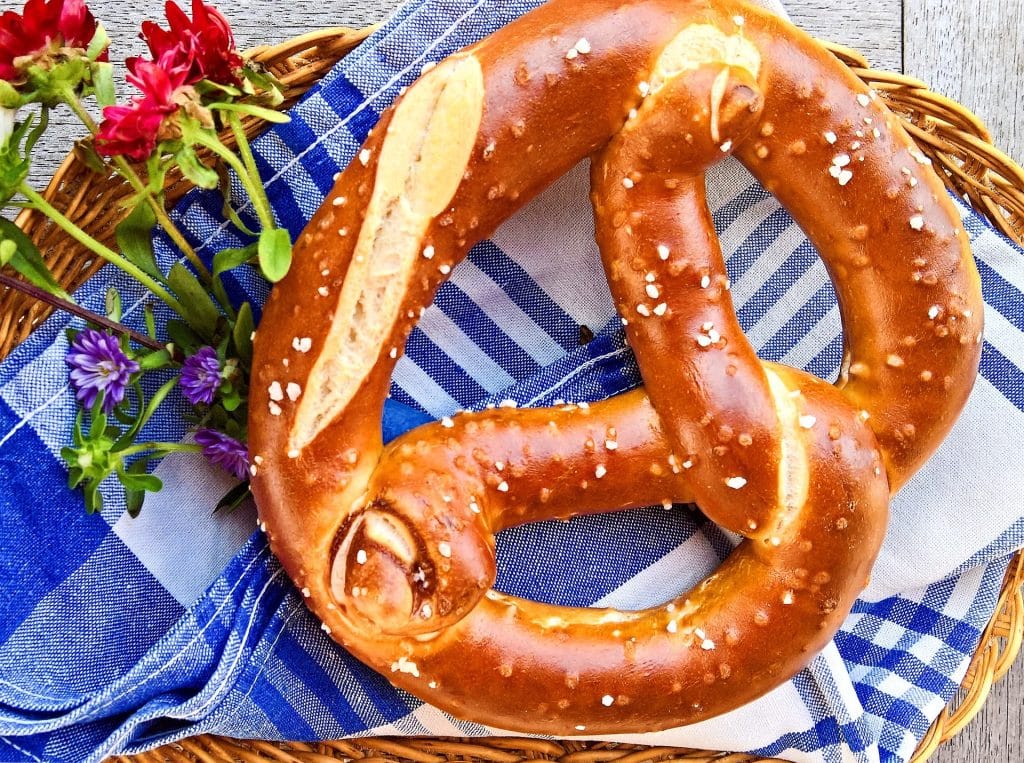Can Dogs Eat Pretzels? A Vet’s Opinion

Pretzels can be a sweet and salty treat, but can you feed Pretzels to your dog?
Pretzels shouldn’t usually be given to dogs but can be given as a treat sometimes. Dogs can consume various foods because they are omnivores, but pretzels are not a good or nutritious choice.
Benefits Of Pretzels For Dogs
There are just a few potential benefits of pretzels for dogs, even though they are not advised as a standard component of a dog’s diet due to their high salt, sugar, and carbohydrate content. These consist of the following:
- Taste: Some dogs might love the flavour and crunch of pretzels. Dogs’ taste preferences can differ. Therefore some might not be interested in pretzels.
- Mental stimulation: For certain dogs, chewing on a crunchy pretzel can be mentally stimulating and satisfying. Chewing is a behaviour that comes naturally to dogs and can be used to relieve tension or boredom.
- Occasional Treat: On rare occasions, if the dog is healthy and the pretzel is free of potentially dangerous elements like salt, sugar, spices, or other additions, a tiny piece of a plain, unsalted pretzel could be given to the dog as a treat. Even in this situation, you should proceed with caution and get advice from your vet before giving your dog any human food.
- It’s important to note that various healthier and safer dog treat options are available that are developed expressly for dogs, such as commercial dog treats produced with high-quality ingredients and suggested by vets. In general, these treats are preferable to pretzels or other human foods that would not supply the proper nutrients for dogs and could potentially result in health problems because they are made to fulfil the nutritional demands of dogs.
- Commercial dog treats: Many commercial dog treats, with a balanced diet and the right components, are made specifically for dogs. These treats come in various flavours, shapes, and textures and can sometimes be given as rewards or utilised for training or dental health.
- Natural Dog Chews: By helping to clean teeth and encourage healthy gums by chewing, some natural dogs chews, such as raw bones, bully sticks, or dental chews developed especially for dogs, can offer dental advantages.
- Healthful Fruits and Vegetables: In moderation, you can give your dog healthful, low-calorie, and fibre-rich snacks like carrots, green beans, or apples (without the seeds or cores).
Homemade dog treats can be a healthier and safer option than store-bought treats since you control the ingredients and serving amounts. Homemade treats should be produced using dog-friendly products and according to veterinary-approved recipes.
It is always essential to consult with your veterinarian before giving your dog pretzels or any other human food to ensure that it is secure and suitable for your dog’s particular needs and state of health.

How To Safely Give Pretzels To Dogs?
Due to their high salt, sugar, and carbohydrate levels, pretzels are typically not advised as a standard component of a dog’s diet. As a responsible pet owner, it’s crucial to prioritise providing your dog with a nutritionally suitable and balanced diet. However, if you still decide to give pretzels to your dog, follow these tips to do so safely:
- Plain and Unsalted: Make sure the pretzels you provide to your dog are plain and unsalted if you decide to do so. Dogs who consume too much salt risk dehydration and other health problems. Pretzels that have been flavoured, seasoned, or coated with any additions should not be consumed since they may contain dangerous components toxic to dogs, such as onions, garlic, or spices.
- Small and Soft: Pick small and soft pretzels so your dog can easily chew and digest them. Avoid eating crispy or hard pretzels since they might choke dogs or obstruct their digestive tracts.
- Pretzels should only be given to dogs in moderation; they shouldn’t be a regular part of their diet. Pretzels don’t give dogs the proper nourishment because they have different needs from humans regarding nutrition. Pretzel overconsumption can result in health problems like gastrointestinal distress, obesity, or tooth troubles.
- No Dips or Toppings: Do not serve any dips or toppings, including cheese, mustard, or other condiments, to pretzels. These substances may be dangerous to dogs, and the extra fat, salt, or sugar may be bad for their health.
- Seek Advice from Your Veterinarian: It’s essential to speak with your veterinarian before giving your dog pretzels or any other human food. Your veterinarian can offer tailored suggestions based on your dog’s unique health situation, dietary demands, and nutritional requirements.
Although it’s not advised to feed pretzels to dogs, giving your pet a diet that’s both nutritionally enough and balanced is crucial. To maintain your dog’s health and well-being, stick to dog-specific treats and diets explicitly created for dogs and endorsed by veterinarians.
Will Pretzels Make A Dog Sick?
Pretzels shouldn’t usually be given to dogs. Dogs can consume various foods because they are omnivores, but pretzels are not a good or nutritious choice. Pretzels are frequently heavy in salt, sugar, and carbs, which may be unhealthy for dogs if eaten frequently or in significant quantities. Pretzels’ high salt content can cause dogs to drink more water than they need, which can cause dehydration or upset stomach. Additionally, the sugar and carbohydrates in pretzels can cause dogs to gain weight and become obese, resulting in several health issues like diabetes, joint difficulties, and heart disease.
Additionally, dogs can choke on pretzels, especially if they are complex and crispy. Pretzels’ texture and form can potentially put dogs in danger of choking or fatal intestinal obstructions. It’s crucial to contact your veterinarian right away for guidance and medical aid if you suspect your dog has consumed pretzels or any other human food and is displaying signs of discomfort like vomiting, diarrhoea, or difficulty breathing. In general, it’s recommended to stick to a balanced and nutritionally adequate diet specially designed for dogs and to refrain from giving them human foods, such as pretzels, as they may not supply the proper nutrients and may even result in health problems. Before introducing new food to your dog’s diet, always get their approval.

Vet’s Summary
As a result of their high salt, sugar, and carbohydrate content, which can harm dogs’ health, pretzels are not suggested as a staple food for dogs. Pretzels don’t give dogs the proper nourishment because they have different needs from humans regarding nutrition. Pretzels should be given to dogs sparingly and with caution. Pretzels with any toppings or dips containing dangerous components should be avoided when purchasing pretzels for dogs. Instead, choose plain, unsalted pretzels that are small and soft for easy chewing and digestion. Dogs should rely on something other than pretzels as their primary supply of probiotics. Probiotics are good bacteria that help assist a dog’s digestive health. They have often been included in probiotic supplements or dog foods specifically developed to contain probiotics. Before introducing probiotic supplements or changing your dog’s diet, speaking with your veterinarian is crucial. They may make tailored suggestions based on your dog’s requirements and health situation. The proper probiotic supplementation dosage and duration for your dog can be determined with assistance from your veterinarian. Remember that for your pet’s most significant health, a nutritionally suitable, balanced food that includes probiotics should be given under veterinary supervision.
Videos To Watch
You would want to watch this video before you end up giving your dog pretzels:






